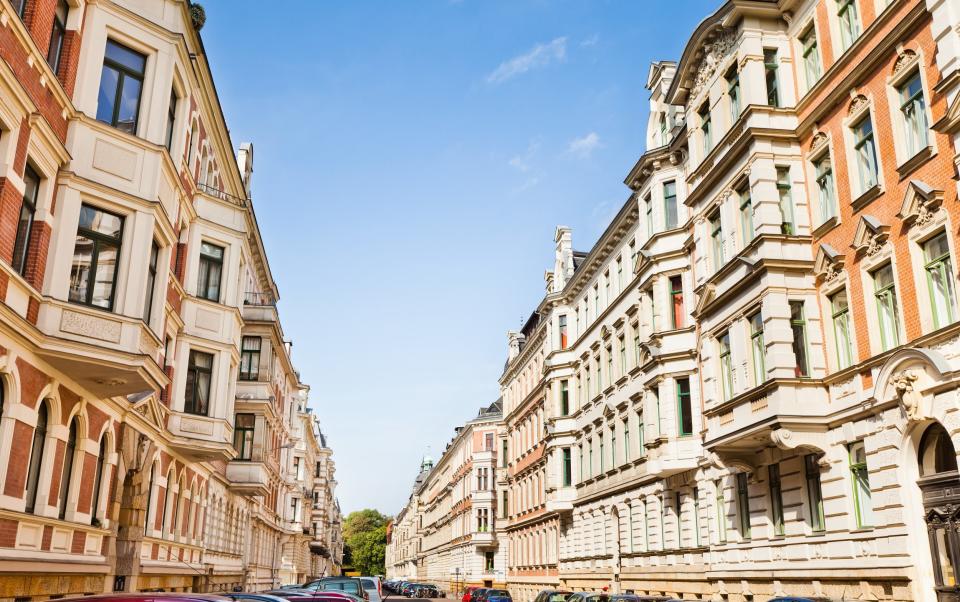Why now is the perfect time to invest in Germany’s plummeting property market

Following speculation regarding a UK property market crash, homeowners were relieved – and prospective buyers dismayed – when prices dipped only slightly during the course of 2023.
Nationwide’s house price index reported just a 1.8pc drop in the average house price in the 12 months to December 2023, a figure far smaller than those forecast by industry analysts a year prior.
Research firm Capital Economics had predicted a downturn of 8.5pc during the same period, while estate agent Savills shot for 10pc.
But while British homeowners enjoyed a semblance of relief, the German house price index saw an annual drop of 10.1pc in the third quarter of 2023, according to federal statistics.
This marked the first annual fall in average German house prices since 2007.
Within the European Union, only Luxembourg suffered a more significant downturn in the year to the fourth quarter, according to Eurostat.
Several factors have contributed to the downturn. The high inflation spreading across the Continent, combined with the high interest rates deployed by the European Central Bank (ECB) to curtail it, crippled the purchasing power of those with ambitions to buy property and scuppered demand for homes.
These conditions, however, were not unique to Germany – so why has its housing market been so disproportionately affected?
This guide will look at whether now is a good time to invest in Germany’s property market, given the unique market conditions that have given rise to a notable dip in prices.
Why are German house prices falling?
One thing that’s kept the British housing market so buoyant in the face of challenging economic conditions is the country’s uninviting rental market.
Some tenants face soaring rents, no-fault evictions and poor living conditions, including rooms plagued by black mould.
German renters have it better.
Landlords are forbidden from hiking costs by more than 10pc above local market rates, tenants can’t be evicted without reason and tenancies tend to last much longer, meaning renters enjoy a greater feeling of stability.
For Germans, when it gets tougher to buy a property, people don’t have an issue with renting until things change.
Threat of regulation from a state protective of its renters has also deterred institutional investors and prevented property prices from climbing, explained Heigo Protten of Global Property Guide, a real estate information website.
He said: “There have been lots of rent controls in the past in Germany, decided by the government. A not-insignificant number of people still have rental contracts from 15 years ago, where the prices have only increased marginally.
“Meanwhile, costs for the landlords and market rents have increased much faster. This is deterring many renters from going out and buying property.”
This could, however, spell an untapped opportunity for landlords willing to put up with the rules, as the high levels of rental demand show no signs of abating.
“On the one hand, there’s a lot of demand for housing, but a lot of those people are looking to rent rather than buy,” said Mr Protten.
Is it easy for foreign investors to buy German property?
While there are obstacles to investing in European property, the German market is particularly friendly to foreign investors, explained Jonathan Gordon of property investment firm IP Global.
“In many European countries, you’ll lose lots of your rental income to tax, and acquisition and selling costs can be extremely high,” he said.
“However, within Germany, you’re able to offset your interest costs and depreciation of the building against the tax you pay on your rental income.
“This puts Germany at the top of the pile in how practical and feasible it is for foreign investors to own property there.”
IP Global’s Nicola Morkel is quick to highlight another eye-catching bonus for prospective investors in Germany. If you own private real estate for 10 years or more, you’ll pay no capital gains tax upon its sale.
The firm therefore encourages its clients investing in Germany to take a medium- to long-term view.

Mortgages for buy-to-let investors are cheaper than elsewhere in Europe, too.
Mr Gordon said: “You’re currently able to get a five-year fixed mortgage deal at 4.1pc annual interest, or a 10-year deal closer to 4pc. Those numbers are pretty healthy compared to what buy-to-let investors would be paying in the UK, let alone overseas.
“We certainly noticed an increase in the number of British investors in the German market when interest rates started to rise in the UK.”
As a foreign investor, you’ll need to stump up about 35pc of the cost of a property in order to secure a mortgage, according to Mr Gordon.
If the German property market offers such an ideal landscape for foreign investors, why have institutional investors been put off?
“Given that it’s Germany, there’s a regulatory risk to consider,” explains Mr Protten.
“The government could decide at any given moment that rents are too high and that it needs to cap rents or rent increases, giving rise to a situation that isn’t favourable to the investor.”
A sudden introduction of rent controls would also impact small-scale investors, who might suddenly find themselves faced with a limited rental income that fails to keep up with costs or current market rates.
What to look for in a potential investment property
There are a lot of factors to consider when weighing up whether to invest in German property.
Areas within commuting distance of larger cities, Mr Gordon noted, can be excellent places to look for low-cost, high-potential options.
“Investors should consider looking not just at the luxurious but the affordable side of the market,” he explained.
“One- and two-bedroom properties of 70 sq metres or less that are close to transport links can offer great value.”
Prime city centre locations are a no-no.
“Would we consider investing in prime Berlin at the moment? No. Would we consider investing in the outer areas with a thirty-minute commute into the centre? Absolutely.
“Leipzig [a city some 200km south-west of Berlin] is one area that has really caught our eye and outperformed the market over the last few years.”

Consulting local property brokers can give you an idea of how strong rental demand in an area is; low vacancy rates are a sign that you won’t have trouble finding tenants.
“One key thing you need to look for is predictable occupancy,” said Mr Gordon.
“In an area like Leipzig, there’s a really tight rental market with vacancy rates of under 1pc, so we’re seeing year-on-year increases in yield for investors.”
Mr Protten also urged prospective investors to consider the energy efficiency ratings of properties they look at.
The EU requires its member states to adhere to a variety of energy efficiency targets, and this could have repercussions for owners of certain properties.
Only 11pc of properties in Germany boast a high energy efficiency rating, according to a 2023 report from real estate firm McMakler.
“Many properties in Germany have very bad energy ratings,” he said.
“If you were to invest in them now, you might get them at a good price, but you may be forced to refurbish them later down the line to improve their energy efficiency.
“While the German government might end up funding refurbishments, which would result in a win-win situation, there’s no guarantee that this will happen, and the investor could end up footing the bill.”
How much could investors earn?
Most investors will primarily be interested in potential yields – but they’re not the only factor to consider.
Mr Gordon said: “In a rapidly expanding industrial city such as Leipzig, you’re looking to pay somewhere between €250,000 (£210,780) and €350,000 for a property, and you could borrow up to 65pc of that amount if you wanted to. You’d be looking at an expected yield of 6pc gross, or around 5pc net.
“Within Berlin – again, we’re not looking at the prime areas, but those with a travel time of half an hour or so into the centre – you’re looking at €400,000 to €600,000. Here, the annual rental yield would be closer to 5pc gross, or just over 4pc net.”
While these yield figures are not dissimilar to those on offer for investors in the UK property market, the tax-offsetting schemes available in Germany combined with the lack of capital gains tax after 10 years and relatively low mortgage rates might give investors serious food for thought.
How to get started investing in German property
If you’re keen to start a continental property portfolio, one way to get going is consult an investment firm that specialises in foreign real estate.
This can save you time researching potential areas and properties to invest in, and the firms can also help you navigate a foreign banking system if you’re hoping to apply for a mortgage.
They can also help with the homebuying experience. However, this all comes at a price.
Local firms that specialise in helping British investors buy property in the German market charge up to 6pc of the sale price of a property as commission, according to Mr Gordon.
While IP Global doesn’t charge commission, instead making its money by buying property in bulk and reselling it at market value to investors, this limits you to the properties it has in its portfolio.
If you’re willing to try and go it alone, you could save significantly on the upfront costs or commission associated with roping in the help of an investment firm.
In this case, approaching property brokers in Germany is a good place to start.
Ask as many questions as you can about the properties on offer, and the areas that they’re in. In some instances, they may be able to help you ascertain the profitability of a potential investment.
Several websites let you search their databases for thousands of properties within Germany, including atHome, Rightmove and Zoopla.
Rental agencies in Germany can manage the letting of properties you own on your behalf.
IP Global’s sister company, Prime Residential, partners with a local agency to do this for its clients. It charges a management fee of 10pc of your rental income plus VAT for its services.
You can pay for a German property using a UK bank account by making international money transfers.
However, you’ll be at the mercy of your bank’s exchange rate – given the potential size of the transactions, it’s important to shop around and consider various providers that can help you transfer cash abroad.
Are property prices expected to rise soon?
There is no way of knowing with any certainty what the future holds for the German market, and as with any investment, the value of property you buy can go down as well as up.
Nonetheless, Mr Protten is cautiously optimistic that things will be looking up soon – and prospective investors would do well to get in now.
“I’d say that today is a somewhat good time to look at the German real estate market,” he said.
“The demand is naturally there. Returns in the German market have in the past been very steady, and it’s often used by investors as a hedge [against inflation]. There’s a chance that property prices could rise quite quickly.”


 Yahoo Finance
Yahoo Finance 